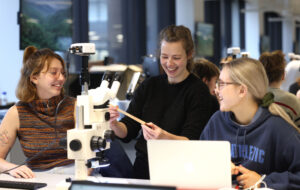How you'll learn
To make sure you get a well-rounded education, we use a combination of different teaching styles, like lectures, seminars, tutorials, and practical sessions like group projects and field visits. All the course materials are waiting for you on the teaching homepage, so you can easily access what you need.
We want you to take an active role in your learning journey, so we encourage you to plan and organize your studies, whether that’s on your own or with a group. Don’t be shy about participating in class discussions, seminars, and library and IT studies. And make sure to get some real-world experience through practice contacts and site visits related to your coursework submissions.
How you're assessed
We use a mix of assessment methods, like coursework like essays, reports, and seminar presentations, as well as exams.
These assessments give you a chance to dive deep into specific parts of the course and show off your writing skills for different audiences. You’ll also have the chance to practice your speaking skills with seminar presentations and work as part of a team on group projects.
You’ll get to demonstrate your knowledge, understanding, and critical thinking skills during exams and in a final research project in the summer.
Liverpool Hallmarks
We have a distinctive approach to education, the Liverpool Curriculum Framework, which focuses on research-connected teaching, active learning, and authentic assessment to ensure our students graduate as digitally fluent and confident global citizens.
The Liverpool Curriculum framework sets out our distinctive approach to education. Our teaching staff support our students to develop academic knowledge, skills, and understanding alongside our graduate attributes:
- Digital fluency
- Confidence
- Global citizenship
Our curriculum is characterised by the three Liverpool Hallmarks:
- Research-connected teaching
- Active learning
- Authentic assessment
All this is underpinned by our core value of inclusivity and commitment to providing a curriculum that is accessible to all students.









